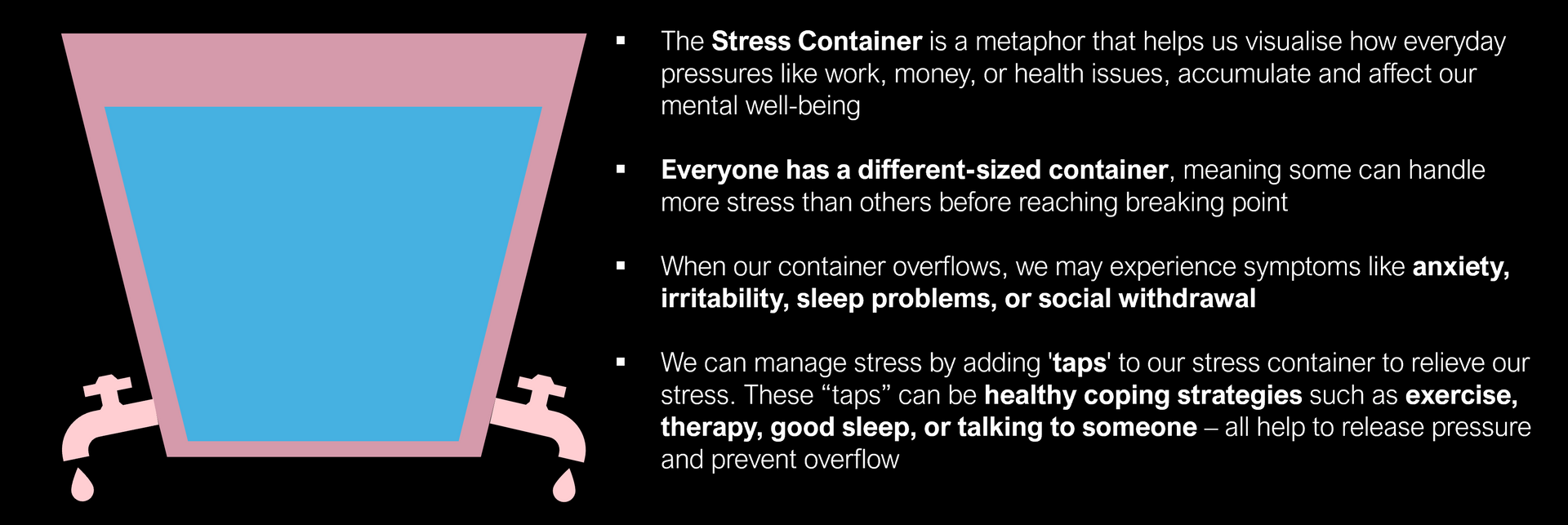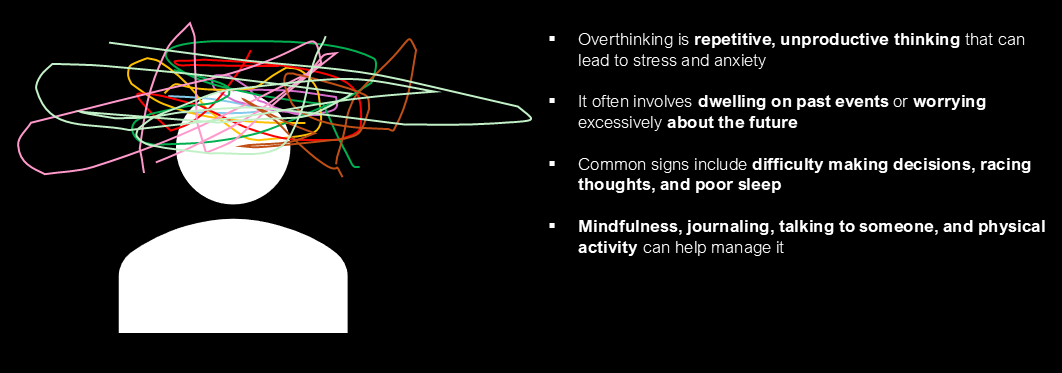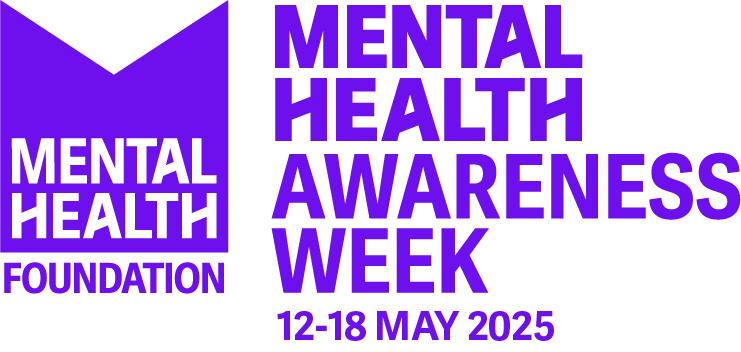12/05/25 |
Mental Health Awareness Week: Managing Stress with Self-Awareness and Community|
A couple weeks’ back, I joined a webinar hosted by
MHFA England called,
Start with you: Managing stress to strengthen your community.
I came across this Webinar in MHFA England’s April newsletter and I’m so glad that I caught it in time. The webinar was brilliant. Facilitated by
Jo Wood (Learning and Development Specialist at MHFA England) with guest speakers,
Julie Castleman (Mental Health & Suicide Prevention Trainer) and
Anna Gilchrist (Founder of
Dei Sensi , a sensory-based practice), this webinar explored how we can better understand and manage stress in the workplace through self-awareness, practical coping strategies, and the science behind stress responses. It also introduced tools like the DRAMMA model and sensory regulation techniques - particularly the use of scent - to support resilience, recovery, and overall wellbeing.
Did you know that this week is Mental Health Awareness Week?
Established in May 2001 by the Mental Health Foundation, Mental Health Awareness Week aims to increase awareness of mental health issues, encourage open conversations, and reduce stigma.
This year’s theme for Mental Health Awareness Week (12th – 18th May) is “Community.”
And when it comes to our communities - especially those we’re part of at work - the stats speak volumes. According to
New Leaf Health, work-related stress, anxiety, or depression made up 49% of all new or long-standing health conditions in 2022/23. That’s nearly half.
Yet despite how widespread these issues are, a 2024 employee survey by
Stribe revealed that only 13% of employees feel comfortable talking about their mental health at work. This silence comes at a cost - not just to people, but to organisations too. The good news? As shared by
Berwick Devoil Healthcare Limited (BDHL) , for every £1 invested in mental health interventions, employers could see a return of £5.30 through reduced absence, presenteeism, and staff turnover. It’s a powerful reminder that supporting mental health isn’t just the right thing to do - it’s also good business.
So why is Community important for your mental health? Community plays a vital role in supporting mental health by fostering a sense of belonging, reducing isolation, and providing emotional support. Engaging with a community can offer you a network of relationships that contribute to your wellbeing. As the saying goes, “ a problem shared, is a problem halved”. Community is the cornerstone of mental health.

When it comes to managing stress, one of the most powerful takeaways from the webinar was the idea of “putting on your own oxygen mask first.” It’s about recognising the early signs of stress, knowing your limits, and building a personal toolkit that helps you cope before things spiral.
We explored something called the “Stress Container” – a metaphor that illustrates how stress builds up differently for everyone.
If your container overflows, that’s when burnout, anxiety, or emotional outbursts can hit. But here’s the good bit: healthy coping strategies act like taps that release that pressure. A big part of this is understanding your own stress signature – those early physical, mental, or behavioural signs that signal when you're starting to feel overwhelmed. We also looked at
Polyvagal Theory – which explains how your nervous system responds to stress – and why understanding whether you're in a calm, reactive, or shutdown state can make a real difference in how you support yourself and others. It all circles back to self-awareness and creating space to reset before you reach boiling point.

What does your Stress Signature look like?
Well, for me, it always starts with an intense sense of worry - usually powered by the dreaded “What ifs”
“What if they misunderstood me?”
“What if I came across as harsh or insensitive?”
“What if I am all these negative things they said about me?”
It’s always the “What ifs” that light the match, setting off my anxiety. Then comes a wave of sudden tiredness, a feeling of hopelessness, and a general lack of motivation. Not long after, the overthinking kicks in. I start replaying conversations or situations over and over in my head - especially the ones that didn’t go well.
At work, I’ve noticed that when I start feeling more irritable than usual, it’s a clear sign I’m not present. Instead, I’m caught up in a loop of negative thinking that’s completely hijacked my focus.
If I had to rank the top three worst feelings? Anxiety would definitely make the list - a strong number two or three, easily.

Managing Stress Through Scent
A fascinating part of the webinar was the discussion led by
Anna Gilchrist, founder of
Dei Sensi, on how scent can be used as a tool for managing stress. Anna explained that our sense of smell is closely linked to memory and emotion, making it a powerful way to ground ourselves in the present. Rather than there being a universally calming scent, it's all about personal associations - what soothes one person might unsettle another. By pairing a familiar scent with a calming practice, like deep breathing, we can train our brains to associate that smell with a sense of safety and ease. Over time, the scent alone can become a signal to slow down and reset.
I have two go-to scents that really help me when I need to pause, reconnect with the present, and bring my focus back to the now: peppermint and lavender. These two are my absolute staples - I pretty much swear by them.
Lavender oil (or balm) helps me relax from the inside out. A few deep sniffs and I instantly feel like I’m being wrapped in Mother Nature’s arms.
It’s hard to explain, but the scent of lavender just quiets my mind. No matter where I am, it helps me tap into a moment of calm.
Peppermint oil, on the other hand, is my focus scent. I tend to use it when I need to feel alert and confident in whatever I’m doing.
It’s also a lifesaver when I have a mild headache and don’t have any tablets on me - the cooling effect really helps soothe it. I swear by it every time.
These two scents are really personal to me. When I first started learning how to manage my anxiety - way back when I was 23 - I was introduced to lavender by an old colleague at my first job after uni. And I’m pretty sure it was my sister who put me onto the peppermint game!
Of course, I don’t rely solely on these scents to keep my anxiety in check. I use a mix of different techniques that help me stay present, self-aware, and optimistic. But I’d be lying if I said scent didn’t play a crucial part. It’s definitely one of the main tools in my mental wellness kit.
Mental Health First Aid National Trainer Julie Castleman introduced us to the
DRAMMA Model - an evidence-based approach to managing stress by improving work-life balance. Julie walked us through six key elements:
- Detachment (mentally switching off from work during downtime)
- Relaxation (engaging in calming activities to support detachment)
- Autonomy (focusing on what you can control)
- Mastery (building confidence through progress)
- Meaning (aligning your work with your values)
- Affiliation (nurturing connections and belonging)
Together, these areas help foster a greater sense of control and purpose, both at work and beyond.
It's clear that stress management isn't a one-size-fits-all solution - it's deeply personal. Whether it's through scents that bring you peace, stress signatures that help you recognise when you need a reset, or strategies like the DRAMMA model, the key takeaway is this: prioritising mental health is not only about coping but also about building a community where support is normalised.
This Mental Health Awareness Week, let's remember that taking care of ourselves isn’t selfish -
it’s essential.


